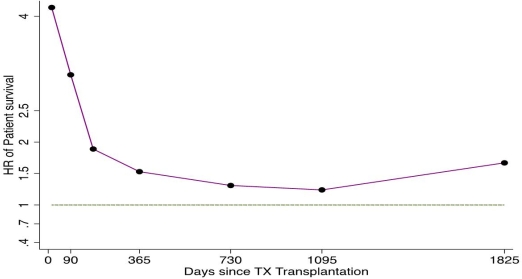Survival Benefit of ECD Transplantation After Ultra-Long Dialysis Exposure: Implications for Acceptance in the New KAS
Division of Nephrology, University of British Columbia, Vancouver, BC, Canada.
Meeting: 2015 American Transplant Congress
Abstract number: 87
Keywords: Donors, marginal, Multivariate analysis, Survival, Waiting lists
Session Information
Session Name: Concurrent Session: Economics, Policy and Ethics
Session Type: Concurrent Session
Date: Sunday, May 3, 2015
Session Time: 4:00pm-5:30pm
 Presentation Time: 4:48pm-5:00pm
Presentation Time: 4:48pm-5:00pm
Location: Room 118-C
The survival benefit of ECD transplantation varies with the duration of pre-transplant dialysis exposure.
We analyzed the survival benefit of ECD transplantation (Kidney Donor Profile Index ≥85%) among 58,672 adult wait-listed patients who initiated dialysis between 1995-2007 and had “ultra-long” pre-transplant dialysis exposure (dialysis treatment ≥ 5 years).
We used multivariate non-proportional hazards analysis, with transplantation treated as a time-dependent covariate to account for the fact that patients switched from dialysis to transplantation at different times. Follow-up was censored at the time of transplantation from a living donor or at the time of permanent removal from the wait-list. To determine the survival benefit under conditions where there is no opportunity for SCD transplantation, we repeated the above model with follow-up censored at the time of transplantation from a deceased donor with a KDPI <85%.
ECD transplantation was associated with an increased risk of death compared to the alternative of remaining on the wait-list or SCD transplantation (figure). These findings were consistent in sub-group analyses (table).

| Subgroups of wait-listed patients with dialysis exposure of ≥ 5 years | Hazard Ratio for death with ECD TX versus wait-listing or SCD TX | Hazard Ratio for death with ECD TX vs wait-listing |
| Diabetic (n=23,166) | 1.36 (1.25,1.47) | 1.14 (1.05,1.25) |
| Non diabetic (n=35,506) | 1.70 (1.58,1.82) | 1.37 (1.26,1.48) |
| Age<60 years (n=44,120) | 1.66 (1.57,177) | 1.42 (1.33,1.51) |
| Age>60 years (n=14,552) | 1.29 (1.17,1.42) | 0.97 (0.87,1.08) |
Surprisingly, even when censoring for SCD transplantation, there was still a higher risk of death among ECD recipients and this was consistent in all sub-groups except patients ≥ 60 years (Table).
These findings suggest that ECD transplantation may not be beneficial for patients with ultra-long dialysis exposure, with the possible exception of those ≥ 60 years with no possibility for SCD transplantation.
To cite this abstract in AMA style:
Kennedy C, Dong J, Myint T, Rose C, Johnston O, Gill J, Gill J. Survival Benefit of ECD Transplantation After Ultra-Long Dialysis Exposure: Implications for Acceptance in the New KAS [abstract]. Am J Transplant. 2015; 15 (suppl 3). https://atcmeetingabstracts.com/abstract/survival-benefit-of-ecd-transplantation-after-ultra-long-dialysis-exposure-implications-for-acceptance-in-the-new-kas/. Accessed June 30, 2025.« Back to 2015 American Transplant Congress
